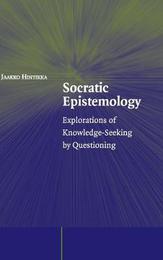
|
Socratic Epistemology: Explorations of Knowledge-Seeking by Questioning
Hardback
Main Details
| Title |
Socratic Epistemology: Explorations of Knowledge-Seeking by Questioning
|
| Authors and Contributors |
By (author) Jaakko Hintikka
|
| Physical Properties |
| Format:Hardback | | Pages:248 | | Dimensions(mm): Height 230,Width 155 |
|
| Category/Genre | Philosophy - epistemology and theory of knowledge |
|---|
| ISBN/Barcode |
9780521851015
|
| Classifications | Dewey:121 |
|---|
| Audience | | Tertiary Education (US: College) | | Professional & Vocational | |
|---|
|
Publishing Details |
| Publisher |
Cambridge University Press
|
| Imprint |
Cambridge University Press
|
| Publication Date |
3 September 2007 |
| Publication Country |
United Kingdom
|
Description
Most current work in epistemology deals with the evaluation and justification of information already acquired. In this book, Jaakko Hintikka instead discusses the more important problem of how knowledge is acquired in the first place. His model of information-seeking is the old Socratic method of questioning, which has been generalized and brought up-to-date through the logical theory of questions and answers that he has developed. Hintikka also argues that philosophers' quest for a definition of knowledge is ill-conceived and that the entire notion of knowledge should be replaced by the concept of information. He offers an analysis of the different meanings of the concept of information and of their interrelations. The result is a new and illuminating approach to the field of epistemology.
Author Biography
Jaakko Hintikka is an internationally renowned philosopher known as the main architect of game-theoretical semantics and of the interrogative approach to inquiry, as well as one of the architects of distributive normal forms, possible-worlds semantics, tree methods, infinitely deep logics, and present-day-theory of inductive generalization. Currently a professor of philosophy at Boston University, he is the author of more than thirty books and has received a number of honors, most recently the Rolf Schock Prize for Logic and Philosophy, for his pioneering contributions to the logical analysis for modal concepts, in particular the concepts of knowledge and belief.
|